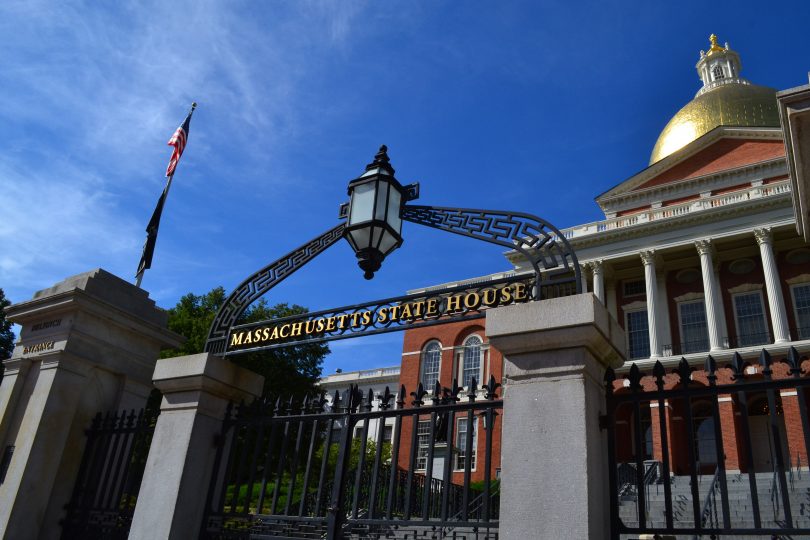By Jusneel Mahal
Boston University Statehouse Program
The Massachusetts Republican Party faces a make-or-break gubernatorial election.
Democrats comfortably control the Massachusetts House of Representatives; Senate Democrats currently hold a 34-seat advantage; and with a Maura Healy win in November, the Democrats could control the governor’s office for just the second time since Michael Dukakis left office in 1990.
Academics, experts, and party members question whether Massachusetts has become a one-party state.
“There’s a first party, and there’s a third party – there is no second party,” said Liam Kerr, founder of Priorities for Progress and co-founder of The Welcome Party, which describes itself as committed to growing the Democratic Party.
Kerr said the MassGOP shouldn’t be treated like a major party in Massachusetts when the state has one of the least competitive legislative elections in the country. The 18-point margin between Republican Anthony Amore and Democrat Diana DiZoglio, for state auditor, is the slimmest between the two parties among the major races.
Evan Falchuk, who ran against outgoing Gov. Charlie Baker in 2014 as a United Independent Party candidate, called the GOP a democracy-denying organization that’s not serious about governing. He said politics are currently rigid in Massachusetts because of the lack of choices.
“You can’t vote for Republicans when they’re not serious about governance, and you can’t vote for third party candidates, because either they have no chance of winning, or they might shift the outcome of the election in ways you don’t like,” Falchuk said.
The former gubernatorial candidate said he learned during his 2014 campaign that voters want choices. He said non-competitive elections have contributed to the Legislature spending less time debating issues and candidates withholding policy specifics during campaigns – Democrats can work behind closed doors because they have a substantial majority.
Priorities for Progress public policy analyst John Griffin said the GOP’s greatest mistake was aligning itself with Donald Trump. He calls the party disorganized and divided because of their current internal struggle between the pro-Trump wing led by party chair Jim Lyons and moderate Republicans who support Baker.
“If the Republican Party was a more serious organization that made more of an effort to appeal to voters more in the middle, they would have more seats in the state Senate right now — they’re just not making any effort to appeal to people in the middle,” said Griffin.
Dave Hopkins, associate professor of political science at Boston College, said it will be difficult for the Republicans to compete in future statewide elections because the moderate candidates, who used to have a track record of being electable, are having a difficult time getting through the primaries.
Hopkins is confused by the GOP’s current strategy. He said Baker, and former Govs. Mitt Romney, Bill Weld, and Paul Cellucci successfully argued during their campaigns that moderate Republicans are needed to keep Democrats in the Legislature and Constitutional offices accountable.
Hopkins said it was difficult for Baker to create a robust party infrastructure because he’s faced internal opposition for not being conservative enough.
“[Baker] was not particularly interested in advancing conservative policies or picking a lot of fights with liberals and in the state Legislature,” said Hopkins. “He didn’t want to risk running for a third term because it’s embarrassing if your own party won’t even nominate you.”
The Boston College professor said Republicans had long-standing problems recruiting candidates. He said young, ambitious moderate politicians who’d previously run as a Republican are now more likely to register as either a Democrat or independent.
“We definitely need another person like Charlie Baker coming along, who can kind of rally the troops again,” said a Republican active in party politics. “Anthony Amore, who is running for auditor, is one of the key people we need to look to, to bring this party forward in the future.”
The Republican activist added that there are divisions within the party because of those currently in charge. They are calling for new leadership who can raise funds and redevelop relationships with donors.
Jaclyn Corriveau, a member of the Massachusetts GOP State Committee, said the media criticism of the party has been fair. She said there are divisions within the party, and if the party doesn’t put in the work that needs to be done, Massachusetts will become a one-party state.
“I’m very optimistic about it [and] I think everyone’s heart is in the right place. It’s just a matter of all coming to the same table and having some really difficult discussions,” Corriveau said.
Efforts to reach Lyons were unsuccessful.
This story originally appeared in The Berkshire Eagle.





